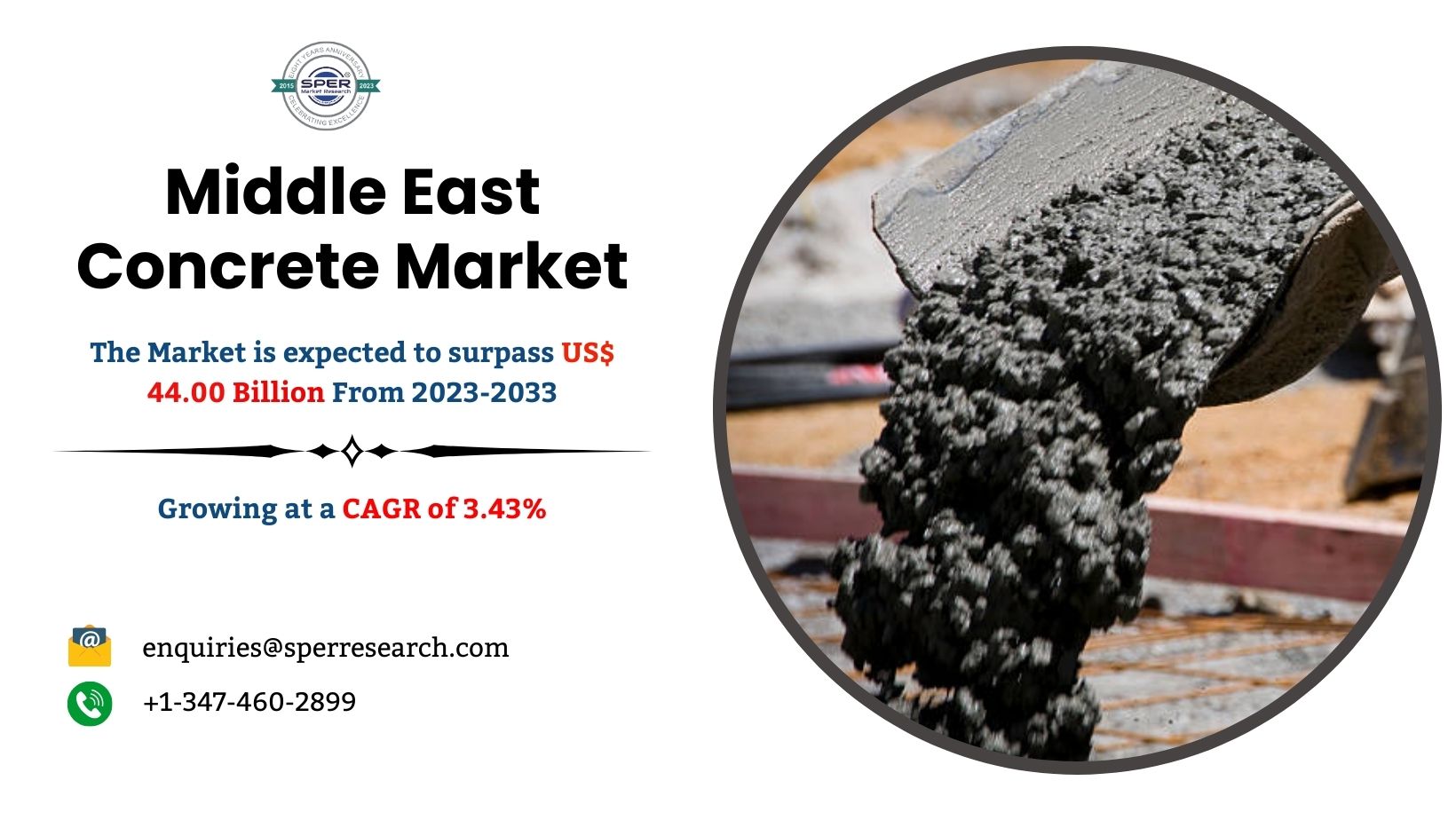Market Overview and Market Insights: The Middle East concrete market encompasses all aspects of concrete production, distribution, and application in building projects across the region. Concrete, known for its versatility in forming various structural shapes, is the most widely used building material, particularly in infrastructure, commercial, industrial, and residential developments. The market includes a diverse range of concrete types, such as ready-mix, precast, and high-performance concrete, and involves stakeholders like manufacturers, construction firms, and raw material suppliers.
SPER Market Research reports in ‘Middle East Concrete Market Size – By Type, By Application, By End User – Regional Outlook, Competitive Strategies, and Segment Forecast to 2033’ that the concrete market in the Middle East is anticipated to reach a value of USD 44.00 billion by 2033, registering a CAGR of 3.43%.
Drivers: Several factors drive the growth of this market in the Middle East. Rapid urbanization and population growth significantly increase the demand for residential and commercial construction. Government investments in infrastructure projects, such as roads, bridges, and public transportation systems, further stimulate market growth. Economic diversification efforts, particularly in oil-dependent nations, boost construction activities in sectors like tourism, hospitality, and commerce. Additionally, advancements in technology enhance quality and efficiency within the building and concrete sectors. The adoption of sustainable construction practices also promotes the use of environmentally friendly concrete alternatives.
Download sample PDF copy of this report to understand structure of the complete report @ https://www.sperresearch.com/report-store/middle-east-concrete-market.aspx?sample=1
Challenges: Despite these growth drivers, the market faces numerous challenges. Harsh weather conditions, such as extreme heat, can affect concrete quality and delay construction timelines. Volatility in raw material costs, especially for cement and aggregates, impacts production expenses. Stricter environmental regulations demand sustainable practices, which may increase operational costs and complexity. The market also experiences disruptions from geopolitical and economic instability, which can affect supply chains and funding for projects. Other significant hurdles include a shortage of skilled labor and the need for modern construction techniques.
Impact of COVID-19: The COVID-19 pandemic had a profound impact on the Middle East concrete market. Lockdowns and project delays caused a significant slowdown in construction activities, disrupting the demand for concrete products. Supply chain issues, including raw material shortages and logistical challenges, further exacerbated delays and costs. Reduced investments in infrastructure and economic uncertainty also hindered market growth. However, the pandemic accelerated the adoption of digitalization and automation in the construction industry, driving advancements in technology to improve efficiency and mitigate future uncertainties.
Market Key Players: Egypt dominates the concrete market in the Middle East, driven by significant infrastructure advancements such as urban development, commercial construction, and transportation initiatives. Key players in the market include Al Kifah Ready-Mix & Blocks, Holcim Group, CEMEX S.A.B. de C.V., Alian Industry Company, Bina Ready-Mix Concrete Products, Gulf Precast Concrete Co. LLC, Al Fahd Company, and others.
Middle East Concrete Market Segmentation:
By Type: Based on the Type, Middle East Concrete Market is segmented as; Ready-Mix Concrete, Precast Product, Pre-cast Elements
By Application: Based on the Application, Middle East Concrete Market is segmented as; Reinforced Concrete, Non-Reinforced Concrete
By End User: Based on the End User, Middle East Concrete Market is segmented as; Saudi Arabia, Qatar, Oman, Yemen, Others
By Region: This research also includes data for France, Germany, Italy, Netherlands, Spain, United Kingdom and Rest of Europe.
For More Information in Middle East Concrete Market, refer to below link –
Middle East and Africa Precast Concrete Market Trends
Others Industry Report –
- United Kingdom Greenhouse Market Size- By Type, By Crop Type, By Equipment- Regional Outlook, Competitive Strategies and Segment Forecast to 2033
- United Kingdom Beauty Care Products Market Size- By Product Type, By Sales Channel, By Origin- Regional Outlook, Competitive Strategies and Segment Forecast to 2033
- United Kingdom Same Day Delivery Market Size- By Mode of Transportation, By Application, By End User – Regional Outlook, Competitive Strategies and Segment Forecast to 2033
Follow Us –
LinkedIn | Instagram | Facebook | Twitter
Contact Us:
Sara Lopes, Business Consultant – U.S.A.
SPER Market Research
+1-347-460-2899


